skip to main |
skip to sidebar
 It is the Olympic rings being used in all its glorious public domain.
HEAPS PEAK IN THE SAN BERNARDINO MOUNTAINS - There is much talk that Los Angeles may be a step closer to hosting the 2024 Summer Olympics. Deals from the L.A. City Council to the International Olympic Committee are still being worked out, and there are a few other things to work out. One of those things to be worked out is competing with other cities around the world to host the games. If all goes well, and many of us hope we receive the answer we are looking for, it would be the third time L.A. will host the Summer Olympics.
Standing at The L.A. Memorial coliseum looking to the north and turning your head to the northeast you can see, provided the inversion layer and its hazy smoggy nastiness is not blocking the view, The Transverse Range, which make up The San Gabriel and San Bernardino Mountains. Having the Summer Olympics in L.A. and throughout Southern California really do make for a perfect fit, but what about The Winter Olympics? I know saying "let's bring The Winter Olympics to Southern California" sounds like a joke, and maybe even a third-tier Woody Allen joke (New York, by the way, has never hosted the Olympic games), but seriously, the powers that be should seriously look at and consider bringing the Winter Olympic games to our local mountains.
Seriously, Could Our Local Mountains Really Host The Olympics?
Yes. The Sochi Olympics wrapped up in February 2014 bringing to end the somewhat contentious XXII Olympic
Winter Games. Among the many real or perceived problems, there was one
real problem, which is the Sochi games were just a little too warm for
the Winter Olympics, which is not unlike our own mountains. The climate in the Sochi area is typically rather
mild and Russian officials stored significant amounts of snow for the
games, just in case. Nonetheless, despite social issues outside the
gates and despite the events in nearby Ukraine, the Sochi games were an overall success.
It is the Olympic rings being used in all its glorious public domain.
HEAPS PEAK IN THE SAN BERNARDINO MOUNTAINS - There is much talk that Los Angeles may be a step closer to hosting the 2024 Summer Olympics. Deals from the L.A. City Council to the International Olympic Committee are still being worked out, and there are a few other things to work out. One of those things to be worked out is competing with other cities around the world to host the games. If all goes well, and many of us hope we receive the answer we are looking for, it would be the third time L.A. will host the Summer Olympics.
Standing at The L.A. Memorial coliseum looking to the north and turning your head to the northeast you can see, provided the inversion layer and its hazy smoggy nastiness is not blocking the view, The Transverse Range, which make up The San Gabriel and San Bernardino Mountains. Having the Summer Olympics in L.A. and throughout Southern California really do make for a perfect fit, but what about The Winter Olympics? I know saying "let's bring The Winter Olympics to Southern California" sounds like a joke, and maybe even a third-tier Woody Allen joke (New York, by the way, has never hosted the Olympic games), but seriously, the powers that be should seriously look at and consider bringing the Winter Olympic games to our local mountains.
Seriously, Could Our Local Mountains Really Host The Olympics?
Yes. The Sochi Olympics wrapped up in February 2014 bringing to end the somewhat contentious XXII Olympic
Winter Games. Among the many real or perceived problems, there was one
real problem, which is the Sochi games were just a little too warm for
the Winter Olympics, which is not unlike our own mountains. The climate in the Sochi area is typically rather
mild and Russian officials stored significant amounts of snow for the
games, just in case. Nonetheless, despite social issues outside the
gates and despite the events in nearby Ukraine, the Sochi games were an overall success.
So, if a place like Sochi with its lack of snow can pull off a
Winter Olympics then why cannot our own Southern California mountains,
The San Gabriel and San Bernardino Mountains, host the winter games?
After all, the weather in our local mountains are about the same as in
Sochi, as you never quite know if it is going to be a snowy year or warm
year, and if it is a warm year our ski resorts know how to make and store quite
of bit of snow.
Where In Our Mountains?
Probably the most logical site for the
home-base of the Winter Olympics would be Big Bear, but however events
could be spread all over the Transverse Range. Spreading out Olympic events is nothing new. It was done in Sochi, and it was done during the 1984 Summer Olympics and 1932 Summer Olympics in L.A. with many Olympic games spread throughout Southern California.
Sure, there would be some infrastructure
that would need to be built, but that would be a boom to the local
construction industry.
Okay. All This New Stuff Is Built, But What Happens When The Games Leave?
What happens when the
Olympics leave the mountain resorts with so much new stuff built? Well,
for places in Big Bear, and perhaps other places in the San Bernardino
and San Gabriel Mountains, they can now brag and sell their ski resorts
as being world famous, and boost their ski resorts from being local
destinations to world destinations. What skier would not love to play
and ski at an Olympic ski resort?
What About The Mountain Roads?
What about accommodating all the Olympic spectators, and those mountain highways?
Yes, as any person who has driven our
mountain highways and roads can attest, the roadways to and around the
mountain towns are not the best, and can provide for a white-knuckle
ride at times, but this would provide the opportunity to improve the
mountain highways.
Furthermore, shuttle service can be
provided to and from events, and up and down the mountain. Also, this
may be an opportunity to explore other unique forms of transportation,
such as a tramway from the base of the mountain to perhaps Big Bear, not
unlike the Palm Springs Tram.
Just Where Is Everybody Going To Stay?
In the mountain towns there would be a
need to build some new hotels, but there are many hotel and motel rooms
down the mountain in the Inland Empire that are underused and could be
used to house Winter Olympic spectators.
Of course before, during and right after
the Olympic games it will be massive boost to the hospitality industry,
and not just in the mountains, but it will have a positive ripple
affect throughout Southern California. It is not an unlikely scenario
that hotels from Palm Springs to L.A. would be filled up with Winter
Olympic spectators.
What About Traffic Down The Mountain?
What about traffic having a ripple
affect in the flat lands? Well, we all worked together during the 1984
games, and during the recent events on Interstate 405, and so why cannot it be
that way again for the Winter Olympics?
Consider It and Bring It To Our Mountains!
We say to the powers that be, bring the
Winter Olympics to the Southern California Mountains. We have, and could
easily have, the infrastructure in place, and hosting the games here
you would not have to worry about any possible social problems taking
center stage at the games. The United States is a very stable place to
hold the Winter Olympics, and our Southern California mountain range
will make it even better.
As an added bonus to consider, though it
is on a smaller scale, Big Bear has hosted the X-Games, among other
such major winter sporting events.
The Winter Olympics in Southern California? Yes, this can be done.
We have already hosted two Summer Olympics, and maybe a third, and now let us take stage in hosting the games The Winter Olympics!
This can be done, and so let us do it!
[NOTE: This originally appeared on this site in February 2014 and has been updated. Also, this site and story is not supported by or affiliated with any local chamber of commerce, booster groups or local Olympic committee. Holding the Winter Olympics in our local mountains is an interested idea to float around and, frankly, something to give serious consideration to.]
THE FLAME SHINING BRIGHT ATOP OF THE L.A. MEMORIAL COLISEUM - For the first time since the 1984 Summer Olympics over 7,000 athletes from 177 countries are at Exposition Park competing in 27 different sports for the Special Olympics World Games. This is an amazing event and Southern California is quite lucky to be hosting such an event. (If you have not had a chance to make it to any events you should go, and most sporting events are free.) Just as these games in Los Angeles are underway with the incredible, inspiring athletes doing what they do best word came way that Boston is withdrawing its bid to host the 2024 Summer Olympics.
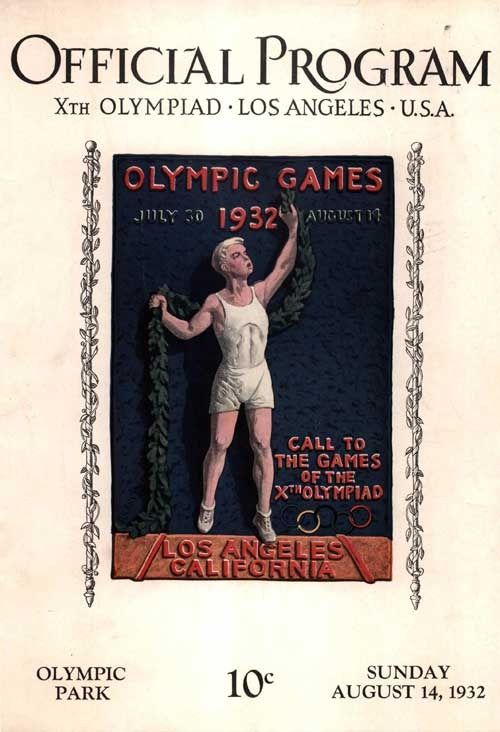 The official program of the 1932 Summer Olympics. Photograph in public domain.
The official program of the 1932 Summer Olympics. Photograph in public domain.
What does this mean? Well, even though there has been no official announcement, yet, L.A. is tip-toeing its way back to bidding on hosting the 2024 Summer Olympics. Of course, at this point in the Olympic bidding game, L.A. still has a very long way to go as they have to compete with not just other cities around the United States, but around the world to win hosting the Summer Olympics.
If L.A. is successful in winning the 2024 games The City of Angels would be the only place in the United States to hold three modern Olympic events.
Before we look forward let us look back to the past to one Summer Olympic event. No, not the 1984 Summer Olympics, which, by the way, is often credited for "saving" the modern Olympics by way of over-the-top opening ceremony pageantry and major corporate sponsorship, but the very first Summer Olympics in 1932, officially known as the Games of the X Olympiad, which opened July 30, 1932.
 Opening ceremony of the 1932 Summer Olympics at L.A. Memorial Coliseum. Photograph in public domain.
Opening ceremony of the 1932 Summer Olympics at L.A. Memorial Coliseum. Photograph in public domain.
How Did L.A. Win the Bid For The 1932 Summer Olympics?
As you may know by now these days a city in the world
bidding to host the Olympics, be it the summer or winter event, is a major competitive event in and of
itself with a lot of wooing and impressing International Olympic Committee (IOC)
officials.
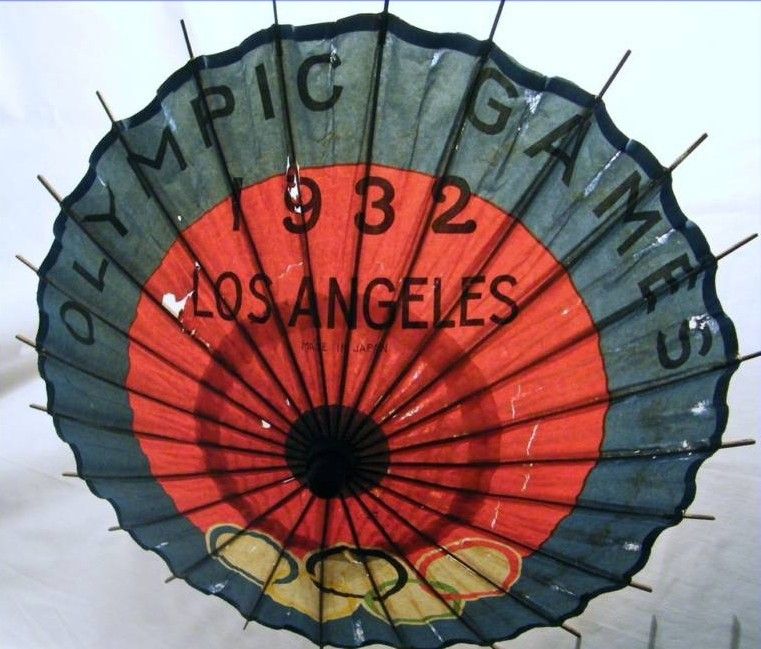 A parasol for those needing some shade from the summer sun while watching the Summer Olympics. Unclear if this is an official Olympic sanctioned item.
A parasol for those needing some shade from the summer sun while watching the Summer Olympics. Unclear if this is an official Olympic sanctioned item.
Now to bid for the 1932 summer games L.A.
did not have a lot of competition in the bidding process to host the Tenth Modern
Olympiad. By not having a lot of competition that is to say L.A. had no competition in bidding to host the games, because L.A. was the only city to bid to host the games.
Why Was L.A. The Only City To Bid On Hosting The 1932 Summer Olympics?
Well, then, as it is now, the decision on where to host the Olympics was made many years in advance. The selection was made at the 23rd IOC Session in Rome, Italy, in 1923, and that decision came on the heels of "the wars to end all wars." Many countries were broke and just weary. So, basically, what was Europe's disadvantage in dealing with the depressing aftermath of World War I was L.A.'s advantage.
The Great Depression Put A Damper On The Olympics
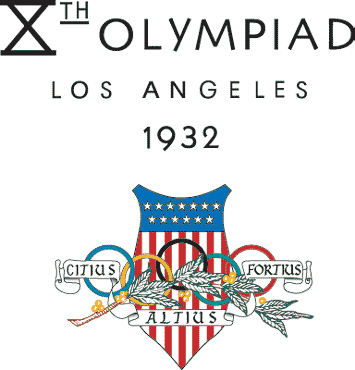 The official 1932 Summer Olympics' logo. Used under public domain.
While the 1920s were a "Roaring" time by the end of that jazz decade the stock market crash of 1929 ushered in the Great Depression.
The depression was so bad that many
nations and athletes just simply could not afford the trip to L.A. to
compete in the 1932 Olympics. In fact, participation in the 1932 games was the lowest since the 1904 Olympics, with only half as many athletes taking part as had in the 1928 Olympics.
The official 1932 Summer Olympics' logo. Used under public domain.
While the 1920s were a "Roaring" time by the end of that jazz decade the stock market crash of 1929 ushered in the Great Depression.
The depression was so bad that many
nations and athletes just simply could not afford the trip to L.A. to
compete in the 1932 Olympics. In fact, participation in the 1932 games was the lowest since the 1904 Olympics, with only half as many athletes taking part as had in the 1928 Olympics.
Adding To The L.A. Olympics' Woes Was California's Remoteness
Atop of the many problems The Great Depression brought on what further compounded problems with the 1932 Summer Olympics was the difficulty of reaching Southern California. Hard to even imagine today of such a thing, but California was still a remote, somewhat isolated area of the world. Remember, in 1932 the main mode of transportation was passenger railway, which could take several days, and airline travel was still a very exotic thing. Driving your car or taking a bus cross-country could be a harrowing experience.
The President Did Not Even Attend The Opening Ceremony, Or Any Olympic Event
With the many problems plaguing the U.S. and world President Herbert Hoover did not attend the opening ceremony or any Olympic event in L.A. Yes, Mr. Hoover, by this point not a very popular president, skipped this major event held in his country.
Mr. Hoover would
be the second U.S. president to miss the Olympics in the United States
held during his term behind President Theodore Roosevelt. Mr. Roosevelt refused to
attend the 1904 Summer Olympics held in St. Louis, because St. Louis
Mayor David R. Francis declined to let Mr. Roosevelt help officiate the
games.
Despite Adverse Conditions The Opening Ceremony Broke Records And Set The Standard For Today's Olympic Opening Ceremonies
With The Great Depression, the President of the United States opting not to attend the games and the problems of just simply getting to Southern California you would think these Olympic games would make the record books for being poorly attended and a general lack of caring for the summer games. Glad to report, you would be wrong.
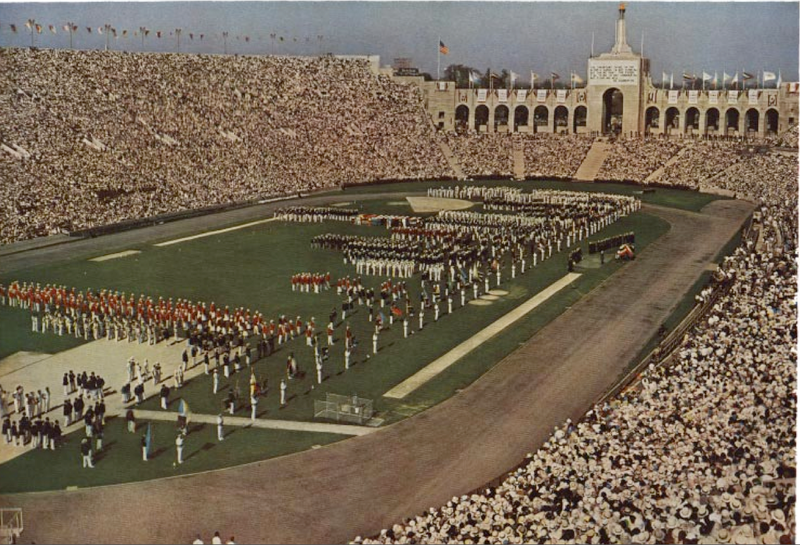 Rare color photograph of the opening ceremony of the 1932 Summer Olympics at L.A. Memorial Coliseum. Photograph in public domain.
Rare color photograph of the opening ceremony of the 1932 Summer Olympics at L.A. Memorial Coliseum. Photograph in public domain.
Turns out over 100,000 people attended the opening ceremony at the Memorial Coliseum, and, according to the Olympic Movement, "Its scale and quality were beyond anything that had come before, creating the first Games we would recognize today."
Furthermore, the 1932 Summer Olympics, according to Olympic officials, "gave birth to the modern format."
The 1932 Summer Games Gave Birth To The Modern Olympic Village
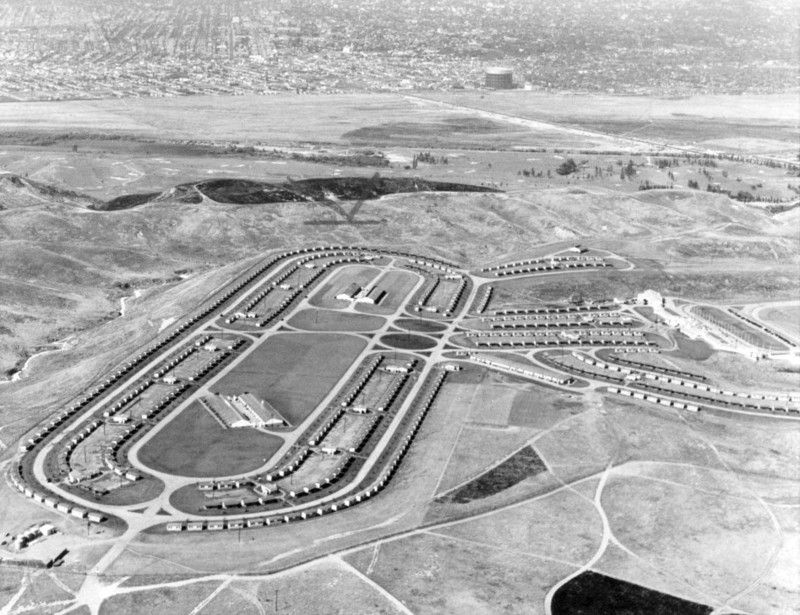 Rare photograph of the first Olympic Village in Baldwin Hills. Photograph in public domain.
Before the 1932 Summer Olympics athletes, their athletic trainers and other Olympic officials basically had to stay at whatever hotel or other housing they could find, and for Olympic officials that ended up being very expensive. That changed in 1932 with the building of the first modern Olympic Village in Baldwin Hills. Now the males stayed in Baldwin Hills while the female athletes were housed at the Chapman Park Hotel on Wilshire Boulevard.
Rare photograph of the first Olympic Village in Baldwin Hills. Photograph in public domain.
Before the 1932 Summer Olympics athletes, their athletic trainers and other Olympic officials basically had to stay at whatever hotel or other housing they could find, and for Olympic officials that ended up being very expensive. That changed in 1932 with the building of the first modern Olympic Village in Baldwin Hills. Now the males stayed in Baldwin Hills while the female athletes were housed at the Chapman Park Hotel on Wilshire Boulevard.
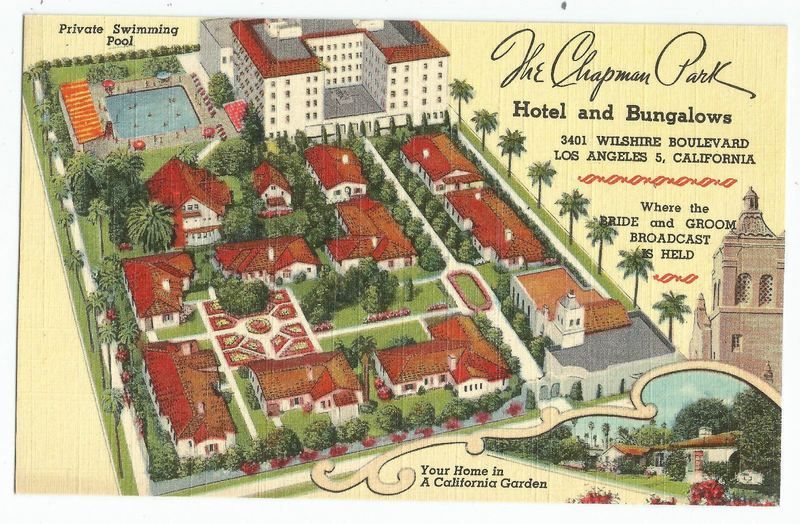 The female athletes competing in the 1932 Summer Olympics stayed in style at the Chapman Park Hotel as shown in this postcard. Photograph in public domain.
The female athletes competing in the 1932 Summer Olympics stayed in style at the Chapman Park Hotel as shown in this postcard. Photograph in public domain.
The idea, and perhaps rough draft, of an Olympic Village came about during the 1924 Summer Olympics in Paris, France, where Olympic organizers built cabins near the Stade Olympique de Colombes to allow the athletes to easily access the Games' venues.
The 1932 Summer Olympics Brought Shorter Games
Before the 1932 Summer Olympics most summer games were around 80 days. By the time the Summer Olympics came to L.A. the days of the games were cut down to 16 days of events. Since then all Summer Olympics have been between 15-to-18 days.
The Victory Podium Was Used For The First Time In L.A.
In what is one of the most iconic sites of every Olympics is the use of the victory podium awarding the gold, silver and bronze metals. This was first introduced during the 1932 Games in L.A.
The 1932 Olympics Is The Reason L.A. Does Not Have a Tenth Street
Sounds strange, but it is true. When L.A. was selected to host what
would be the Games of the X Olympiad, or, the Tenth Modern
Olympics, (or rather, being the only one in the class of nations around the world to raise her hands and volunteer to host the games) to honor the occasion the L.A. City Council voted to change
the name of Tenth Street to Olympic Boulevard (see what the L.A. City Council they there).
What some people may not know is that
Olympic Blvd. is longer than the more famous Wilshire Blvd. as it
stretches from Santa Monica all the way across the city to East Los
Angeles and into Montebello.
By the way, here is an interesting side-note: Olympic Blvd. was once a highway of sorts, California State Route 26.
The Grand Olympic Auditorium In Downtown L.A. Was Built For The 1932 Olympics
Even though there was very little, well, no competition for winning the bid to host the 1932 Olympics the L.A. Olympic committee officials still needed some places and things to impress The IOC. One of those places was the building of The Grand Olympic Auditorium in 1924. When it opened in 1925 it was the largest indoor venue in the U.S. seating over 15,000 people. During the 1932 Games competitions of boxing, wrestling and weightlifting events were held at The Olympic Auditorium.







